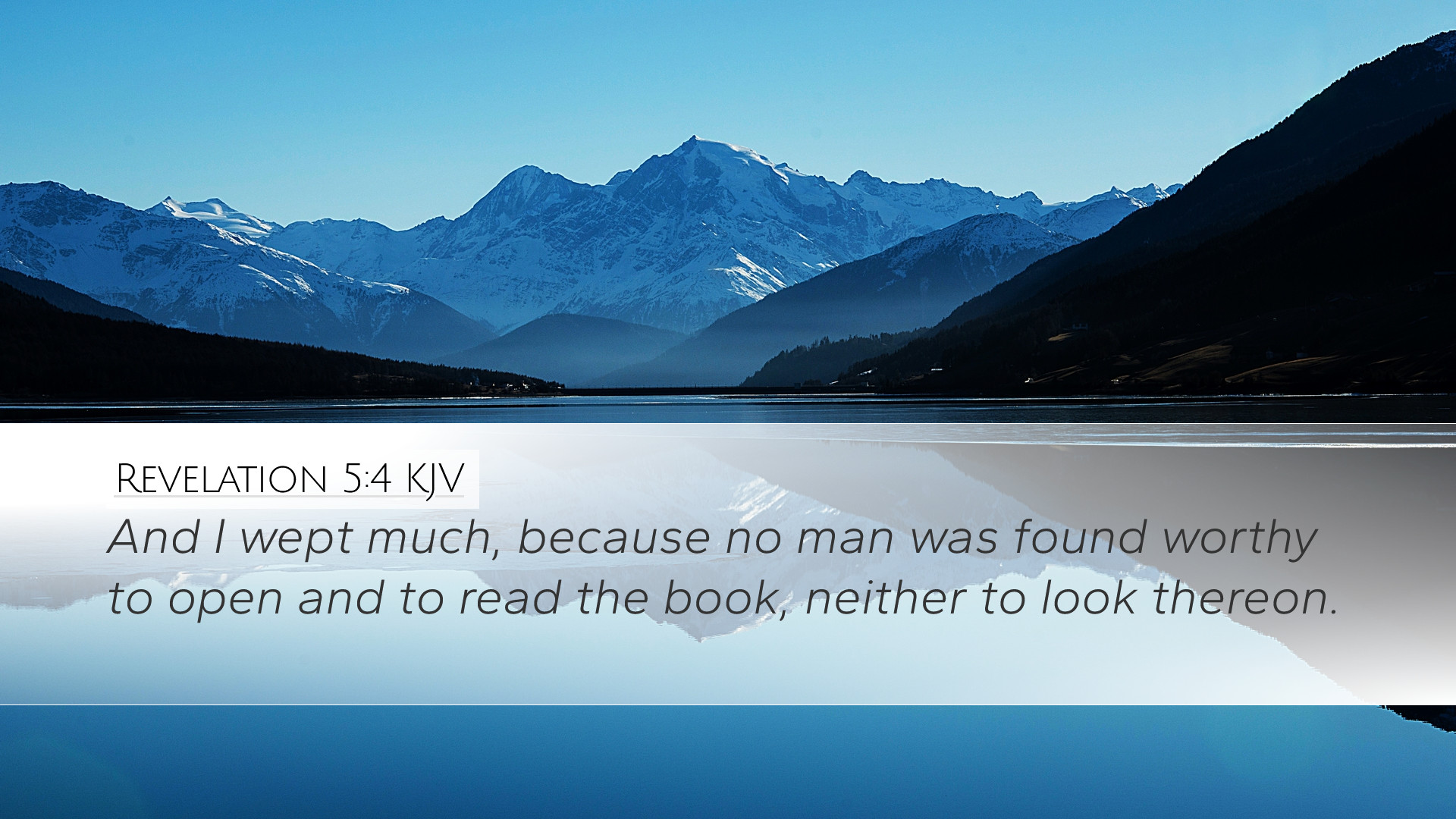Commentary on Revelation 5:4
Revelation 5:4 states: "And I wept much, because no man was found worthy to open and to read the book, neither to look thereon."
This verse is situated in a profound context within the Revelation narrative, and it has invited extensive commentary from various theological perspectives. The solemnity of the moment described can be deeply evaluated through the insights of Matthew Henry, Albert Barnes, and Adam Clarke, each of whom contributes uniquely to our understanding of this scripture.
1. The Context of Revelation 5
Before delving into Revelation 5:4, it is crucial to understand its context. In Revelation 5, John the Apostle is shown a vision of a book sealed with seven seals. The act of opening this book is significant as it contains the future plans and prophecies of God. This dramatic moment illustrates the need for someone worthy to execute God's divine judgment and redemption.
2. Matthew Henry's Insights
Matthew Henry emphasizes the gravity of John's lamentation in this verse. He notes that John's weeping highlights the importance of finding someone who is worthy to fulfill God's redemptive purposes. Henry asserts that this moment reflects the desperation of humanity's condition:
"The book was the record of God’s purposes concerning the church, and the sealed state represented the obscurity of these purposes."
-
Theme of Worthiness: Henry underscores that the worthiness to open the seals is paramount. The absence of anyone worthy symbolizes the human inability to redeem oneself or the world.
-
Connection to Christ: This lament sets the stage for the revelation of Christ as the Lamb. Henry draws attention to the hope embedded in the narrative that, though no one was initially found, "the Lion of the tribe of Judah" was indeed worthy, pointing directly to Jesus.
3. Albert Barnes' Commentary
Albert Barnes offers a theological analysis which is rooted in the interpretation of want and fulfillment. He elaborates on John's overwhelming sorrow, stating:
"The sorrow of John was that there seemed to be no one who could unfold the events of God’s plan for His people." Barnes elaborates on the concept of the sealed book and its implications for prophetic revelation.
-
The Sealed Book: Barnes interprets the book as a symbol of God's secret counsel. The seven seals are reflective of completion and finality in God's plan. The inability to open the book represents the restriction of understanding God’s timeline.
-
The Nature of John’s Weeping: He perceives John's tears as indicative of a more extensive spiritual tension—representing humanity's longing for divine intervention and clarity regarding God’s ultimate purposes.
4. Adam Clarke's Perspective
Adam Clarke's commentary dives deeper into the theological implications of worthiness and divine authority. Clarke articulates the significance of 'weeping' in this context as an emotional and spiritual expression that transcends mere sorrow, evoking a sense of universal neediness:
"John’s weeping signifies the weight of disappointment in the quest for one who could bring clarity and redemption."
-
Character of the Worthy One: Clarke emphasizes the qualifications that would make someone worthy. He elaborates on the necessity of the redeemer embodying both divine authority and human authenticity.
-
Symbolism of Seals: He suggests that the seals indicate the confidentiality and sacredness of God’s decree. The act of opening these seals thereby symbolizes the revelation of God’s plans to humanity.
-
Hope in Despair: Clarke ultimately leads the reader to the hope found in Christ. The fact that no one was initially found worthy drives the narrative to the revelation of the Lamb, establishing a powerful theological thread of hope amidst despair.
5. Theological Implications
The weeping referenced in Revelation 5:4 not only illustrates personal sorrow but also represents a collective human experience of longing for divine visitation and purpose. The need for a mediator, competent to unveil the depths of God’s will, encapsulates a critical theological theme: the inadequacy of humanity juxtaposed with the sufficiency of Christ.
This tension offers a rich field for pastoral application, encouraging spiritual leaders to foster a deeper understanding of the need for Christ’s authority, as well as the necessity to rely on His guidance in times of uncertainty. For students and scholars, this verse serves as an affirmation of the fulfillment of the messianic hope in Jesus, who alone is worthy to open the book, bringing clarity to God’s covenantal intentions.
Conclusion
Revelation 5:4 is more than a narrative flanked by tears; it is a focal point in the divine narrative which transitions the reader from despair to hope. Each commentator—Henry, Barnes, and Clarke—affirms the essential truth that in Christ, the unworthy are made worthy, and the secrets of the divine are ultimately revealed. Thus, this verse beckons not just for personal reflection but also for communal discourse on the necessity of Christ in the journey towards understanding the deeper mysteries of God.


